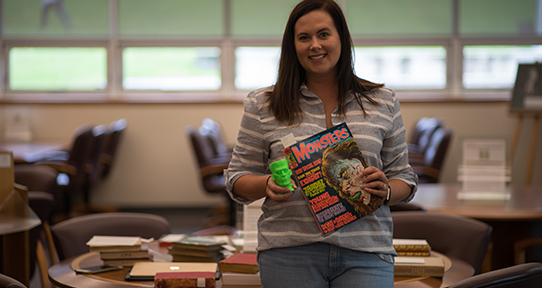English PhD student brings FrankenWeek to life

English PhD student Lindsey Seatter is the brains behind UVic’s FrankenWeek, which celebrates the 200th anniversary of the publication of Mary Shelley’s seminal novel Frankenstein; or, The Modern Prometheus. FrankenWeek, running from Oct. 28 to 31, examines the history, text, themes, and performance of Shelley’s Frankenstein. Events include a livestream of the novel from Washington, DC, film screenings at Cincenta, digital scholarship workshops, and a special UVic Libraries exhibit exploring the novel’s inspiration and legacy. Stephanie Harrington spoke to Seatter about bringing one of literature’s most compelling narratives and characters to life at UVic.
How did you first become interested in Mary Shelley’s Frankenstein?
I first read Mary Shelley’s Frankenstein in an upper-level English class during my undergraduate degree. The class focused on writers of the Romantic era and I was introduced to Shelley alongside Jane Austen, Anna Laetitia Barbauld, and William Wordsworth. What struck me about Shelley’s novel was its depth of insight and emotion. The fantastical elements of the story captivated my attention, but it was the complexity of the characters that sustained my interest. I continued reading and writing about Shelley through my master’s degree and into my doctoral studies, where my research now focuses on Romantic women writers.
How influential has Shelley’s work been on popular culture and beyond?
Hugely influential! Shelley’s novel sparked a legacy of horror and science fiction that can be traced in popular literature, movies, and stage productions. The frightening, shuffling, green monster brought to life in a laboratory, that we deeply associate with Halloween and commonly refer to as “Frankenstein,” was inspired by The Creature in Shelley’s novel—despite having little actual resemblance. Too, the cult classic movie Rocky Horror Picture Show reworks the plot and characters of Shelley’s novel, and this adaptation has since developed its own fervent fan following.
What can we learn from reading Frankenstein today?
The novel wrestles with the impacts of technology on humanity. In our own digital age with smartphones and artificial intelligence, these questions are all the more pertinent. Additionally, despite being set in a time and place far afield from our own, Frankenstein narrates a story of universal experience. In a world so often divided by difference, Frankenstein shows us that we are really all searching for the same things: acceptance and understanding. The frame form of the novel offers us three protagonists that, on the surface, seem so wildly different. And yet, through her narrative, Shelley blurs the distinction between otherness and sameness—revealing that the desires of Robert Walton, Victor Frankenstein, and The Creature mirror each other in significant and compelling ways. The novel also demonstrates how egotism, arrogance, and a lust for power can lead to one’s demise. Readers in 1818 identified with these characters and now, 200 years later, readers can still find contemporary connections to the story.
What are you hoping to accomplish through FrankenWeek?
When planning the University of Victoria’s FrankenWeek our team (comprised of students, librarians, faculty, and academic staff) wanted to draw on the diverse impacts the novel has made on technology, art, literature, and philosophy. Our events demonstrate how Frankenstein is a cultural touchstone by focusing on its history and legacy. We hope that participants walk away from our events with a deeper understanding of the novel and a new appreciation for its contemporary relevance.
What are your top picks for FrankenWeek events?
I would say all of the week’s event are highlights! If you are a literature buff, I would definitely suggest joining us for the opening of our exhibit in the University of Victoria’s Special Collections. The exhibit is titled “Gothic Beginning and Monstrous Legacies: 200 Years of Mary Shelley’s Frankenstein”. We will have a panel of scholars from the English department giving brief talks on items in the collection and we will celebrate the launch with cake. I would also encourage you to check out one of our many film screenings at the campus theatre, Cinecenta. I am particularly excited that we will be showing the National Theatre Live adaptation of Frankenstein starring Benedict Cumberbatch and Jonny Lee Miller.
